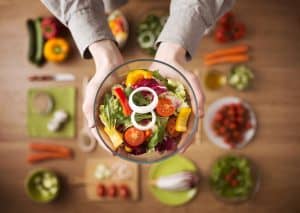The first trimester begins even before you get to know that you’re pregnant! It starts from the last day of your period and goes on till 12 weeks. Weeks 3-8 are extremely crucial for the embryo as organ development (organogenesis) occurs during this time. The neural tube, from which the brain and spinal cord develop, is formed by week 4. Fetal heartbeat and fetal movements are visible on ultrasound by week 6 and 8, respectively.
Weeks 3-8 are extremely crucial for the embryo as organ development occurs during this time.
This period of embryonic growth is highly fragile from genetic factors, environmental conditions, exposure to radiation, maternal infections, maternal illness, smoking, alcohol, excess of vitamin A, or even minor infections from unwashed or uncooked vegetables and fruits can lead to fetal abnormalities.
The First Trimester
Whether planned or unplanned, the news of pregnancy can bring overjoy as well as fear and anxiety. Your body goes through hormonal changes (increase in progesterone and estrogen) in her body.
Mood swings and irritability are at its highest peak during the first trimester. Your appetite and craving for certain types of food may increase drastically. These hormones may also cause untimely crying without any reason.
The first trimester is not only difficult but also a critical part of the pregnancy.
Amidst all the emotional stresses it is highly important to eat healthily for the sound wellbeing of both the mother and the baby.
Therefore, it is essential to know what type and quantity of foods to consume and even more importantly, which one’s to avoid during the first trimester!
Which Foods Should Be Avoided?
Here is list of 10 foods you avoid during your first trimester of pregnancy.
High Mercury Fish
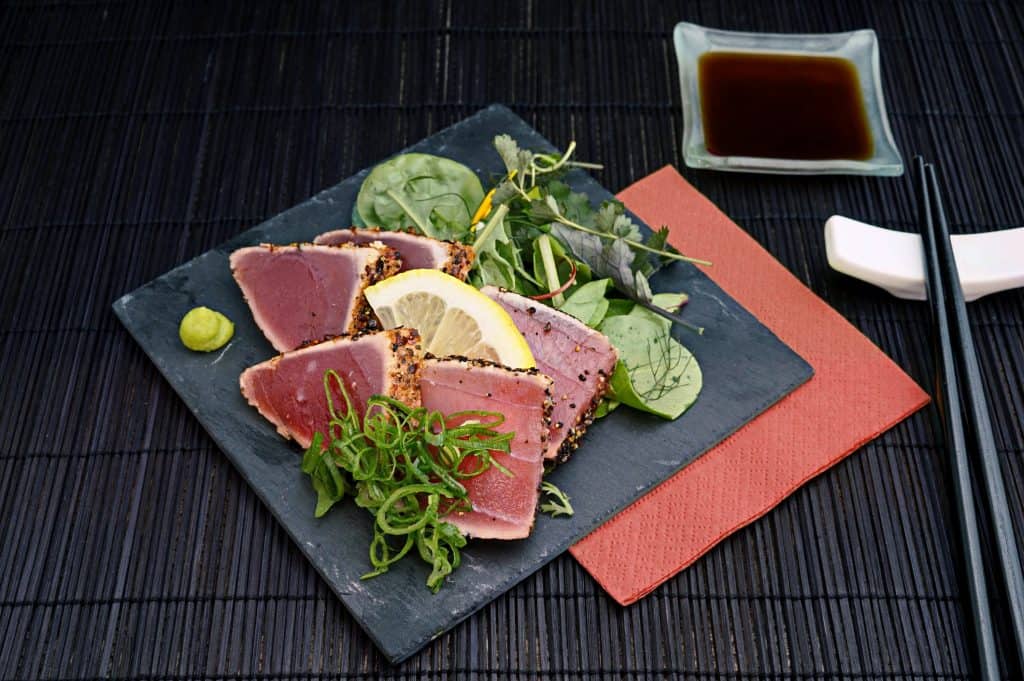
Photo by Wesual Click on Unsplash
Fish is rich in nutrients such as omega- 3- fatty acids, vitamins, iron, and protein. These components are vital for pregnant women. However, not all fishes are recommended during pregnancy. Fish in high mercury content are not advisable as they contain large quantities of methylmercury, which is a neurotoxin. Such fish should be avoided throughout pregnancy, especially during the first trimester where extensive damage to a baby’s developing brain can occur.
Fish in high mercury content should be avoided throughout the pregnancy.
Harmful fishes





Fishes that are safe to consume during pregnancy
According to the Food and Drug Administration (FDA) consumption of 8-12 ounces of low content mercury fish or 6 ounces of high content mercury fish per week is recommended during pregnancy.

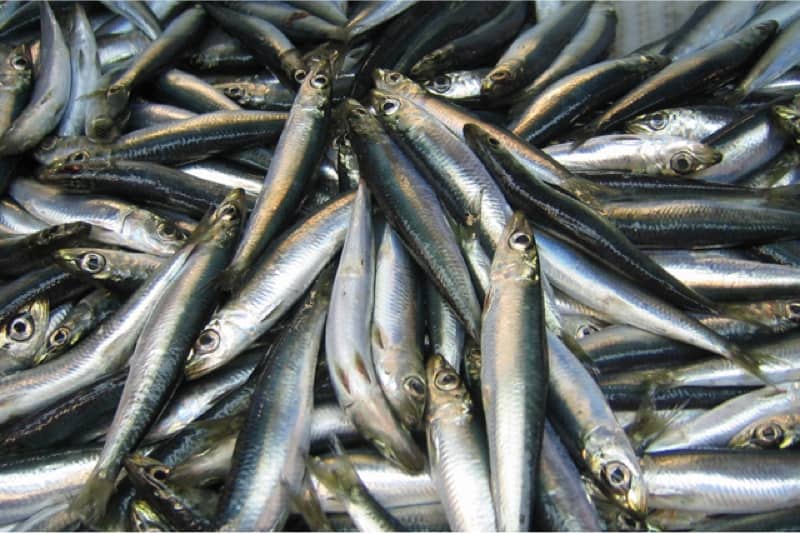


According to the Food and Drug Administration (FDA) consumption of 8-12 ounces of low content mercury fish or 6 ounces of high content mercury fish per week is recommended during pregnancy.
Soft cheese and unpasteurized milk

Photo by Louis Hansel @shotsoflouis on Unsplash
Soft cheeses made from raw or unpasteurized milk can be contaminated with several bacteria including, Listeria, Salmonella, and Escherichia Coli. Listeriosis caused by listeria can result in a miscarriage, stillbirth, or preterm delivery. Listeria thrives in a cold environment and is found in products made from unpasteurized milk.
Cheeses that have been associated with a high risk of listeria infection and should be avoided throughout pregnancy include –


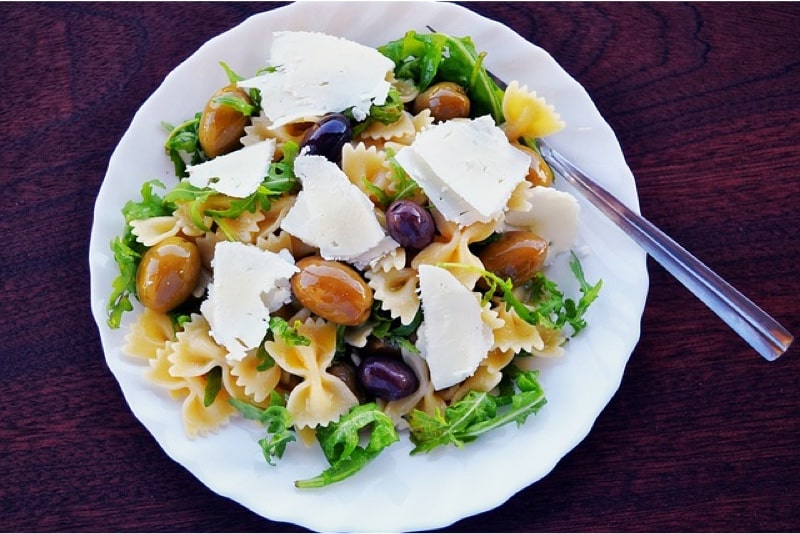


Alcohol

Photo by Michael Discenza on Unsplash
The way our body metabolizes or eliminates alcohol varies from person to person. Women are generally more susceptible to damage from alcohol as they may have less ADH (an enzyme used to break down alcohol) activity.
Even though some studies suggest that drinking a minimal amount of alcohol during the first trimester might be fine, according to the Centers for Disease Control and Prevention (CDC) no amount of alcohol can be considered safe during any stage of pregnancy. It can cause a miscarriage or stillbirth.
As the first trimester is the period of organ development therefore it is the most crucial time to avoid alcohol.
Its consumption during this time can lead to impaired brain development of the baby and can cause Fetal Alcohol Syndrome of the infant. It is characterized by intellectual disability, skeletal and facial deformities, and cardiac defects.
Later on, in the second and third trimesters, intake of alcohol within the advisable limits is considered less risky.
Organ meat

Pikist.com
Organ meat such as liver, heart, and more is a healthy option during pregnancy. It fulfills the mother’s iron, vitamin B12, Vitamin A, and copper needs.
However, excess intake of organ meat, more specifically liver, can result in Vitamin A toxicity which can lead to brain and heart malformations. High levels of copper can also lead to liver damage. According to doctors, the intake of liver meat should be restricted to once per week
The following table shows the approximate values of vitamin A in livers of different animals. According to these values Lamb is the most harmful in relation to vitamin A and Pig is the least harmful.
| Livers of different animals | Amount of Vitamin A per 100gms (in IUs) |
|---|---|
| Lamb | 24,612 |
| Sheep | 20,000 |
| Beef | 17,997 |
| Ox | 17,000 |
| Chicken | 14,320 |
| Pig | 10,000 |
Undercooked meat or fish

Photo by Jason Leung on Unsplash
Raw or undercooked meat and fish, especially shellfish, can be contaminated by a variety of bacteria, viruses, and parasites.
E.coli, found in undercooked meat or fish can give you stomach cramps, fever, and diarrhea which causes dehydration. It can also cause a miscarriage or premature delivery.
Listeria, as already discussed above, can result in a severely deadly infection of the fetus.
Toxoplasma found primarily in undercooked meat can cause toxoplasmosis which is usually asymptomatic at birth but the child can develop blindness and intellectual disability later in life.
Salmonella can cause severe food poisoning (fever, headache, abdominal pain, vomiting, and diarrhea). In some cases, the bacteria can get into your bloodstream and cause sepsis which can be fatal. In rare cases, it can also cause miscarriages.
Rather, this is unpleasant news for sushi lovers and women who love to have their steak medium-rare! It is vital to properly cook meat and fish at high temperatures to avoid contracting any infection.
Raw eggs
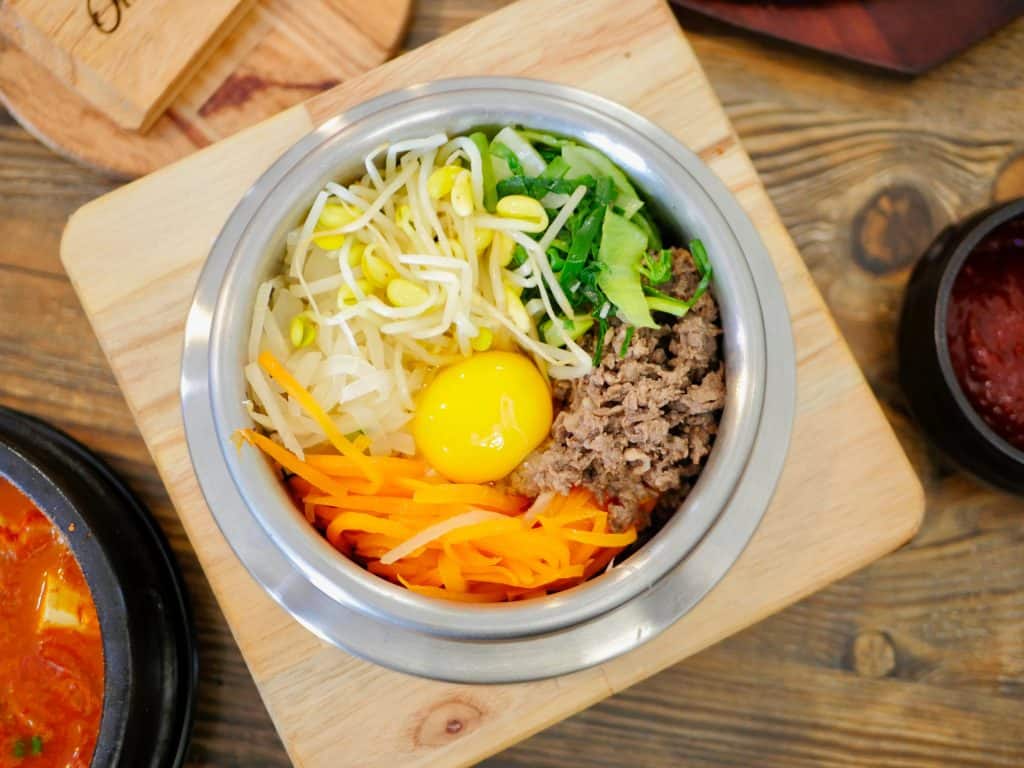
Photo by Isaac Duenas on Unsplash
Raw or lightly cooked eggs are a source of Salmonella infection. It is advisable to properly cook your eggs and not leave them runny. Avoid any food product that contains raw eggs such as mayonnaise, icing, mousses, ice creams, etc.
Pasteurization is a process of sterilization of a product by rapid heating to kill harmful bacteria such as salmonella and other microorganisms.
According to the U.S Department of Agriculture (USDA), pasteurized eggs are safe to consume raw. Pasteurization is a process of sterilization of a product by rapid heating to kill harmful bacteria such as salmonella and other microorganisms. According to USDA and Food Safety and Inspection Services (FSIS) all cartons of eggs and egg products in the United States are pasteurized. Still, it is advisable to check the label on such packages for confirmation. Also, the United Kingdom recently introduced their pasteurized eggs with the ‘Red Lion mark’ which are safe to eat raw. For more information on this you can check the link below.
Caffeine

Engin Akyurt from Image credit: Engin Akyurt from Pixabay
Most people consume high amounts of caffeine daily through different sources such as coffee, black tea, green tea, chocolates, cola, and energy drinks. Provided below is a table enlisting the average caffeine content of the above mentioned items.
| Food Item | Caffeine content | Daily allowance* |
|---|---|---|
| Coffee | 95 mg in 1 cup | 2 cups |
| Green tea | 30-50 mg in 1 cup | 4 cups |
| Black tea | 47 mg in 1 cup | 4 cups |
| Dark Chocolates | 12 mg/ounce (1 bar) | 16 bars |
| Cola | 21 mg in 1 cup | 9 cups |
| Energy drinks | 31 mg/100 grams (1 bottle) | 6 bottles |
*Daily allowance of individual items above is based on recommended limit of 200mg/day of caffeine and assuming only one of the above foods are consumed. However, when consuming several foods in the above table within a day, please adjust limits for individual items to limit overall caffeine intake to up to 200mg/day.
Caffeine is passed on to the babies through the placenta but they are unable to metabolize it. This results in an accumulation of caffeine which can lead to growth restriction and cause the baby to be underweight at delivery.
As per the American College of Obstetricians and Gynecologists (ACOG) caffeine intake should be less than 200 mg/day in pregnant women. It is advisable for a pregnant woman to keep a record of the amount of her caffeine intake everyday and while consuming any product check its label for caffeine content.
The recommended caffeine intake translates to 2 cups of moderate strength coffee per day.
Raw sprouts
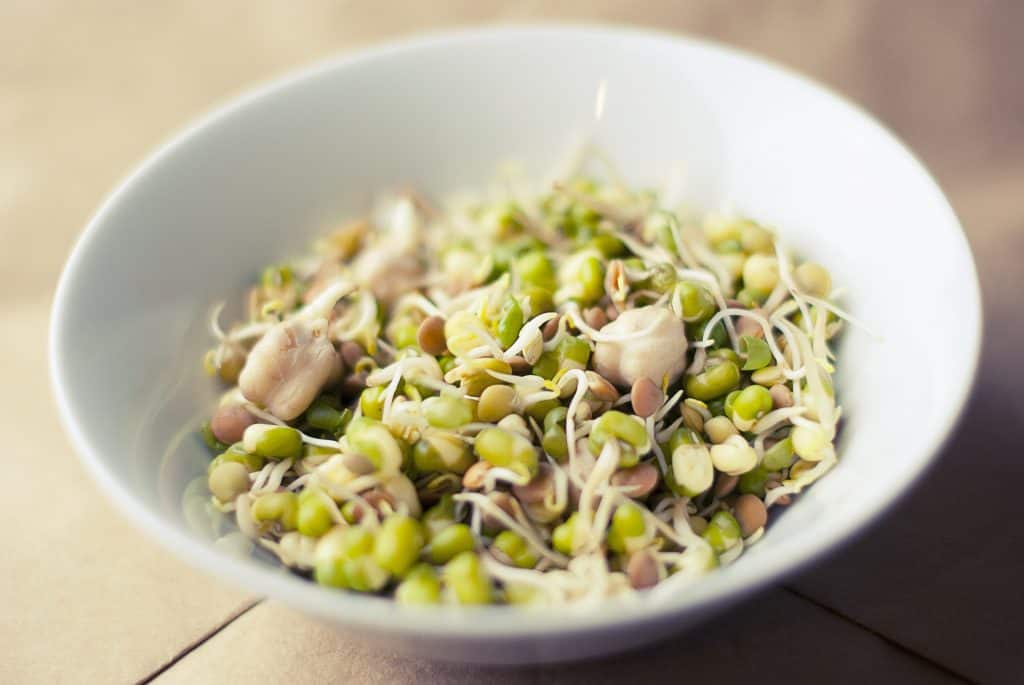
Image credit: Tookapic at pixabay
Bacteria such as Listeria, Salmonella, and E.Coli can make their way into the seed through tiny breaks in the shell of the sprout. By eating raw sprouts you tend to consume the bacteria too!
This can be harmful to you and the baby as these microorganisms can lead to life-threatening conditions. Sprouts such as alfalfa, clover, radish, and beans should be avoided during pregnancy. A single seed can result in illness due to the rapid multiplication of the bacteria. It is recommended to cook all sprouts thoroughly before eating and avoid them raw in salads.
Unripe papaya

Image credit: Wajahat Ahmad at Pixabay
Papaya with a green outer coat is considered to be unripe and should be avoided during pregnancy.
The latex in such a kind of papaya contains a substance called papain. The molecular structure of papain resembles prostaglandins and oxytocin ( substances used to induce labor.) This can initiate uterine contractions and induce labor leading to a miscarriage or preterm delivery.
Unripe papaya can also cause anaphylactic (allergic) reactions. Ripe papaya is safe to consume during pregnancy.
Unwashed produce

Photo by Manki Kim on Unsplash
Generally, it is always recommended to wash vegetables and fruits before eating them. The surface of such foods harbors multiple microorganisms which can be harmful to you and your developing fetus. These include Toxoplasma, E.Coli, Listeria, and Salmonella.
All in all:
| Food | Advisable quantity | When to avoid |
|---|---|---|
| High mercury fish | 6 ounces or less/ week | Consume within limits throughout pregnancy. |
| Soft Cheese | Inadvisable | Avoid throughout pregnancy |
| Alcohol | Inadvisable | Avoid during the first trimester. Can consume within limits later on. |
| Organ meat | Once per week (liver) | Consume within limits throughout pregnancy. |
| Undercooked fish/meat | Inadvisable (cook on high temperature) | Avoid throughout pregnancy |
| Raw eggs | Only pasteurized eggs can be consumed raw | Avoid throughout pregnancy |
| Caffeine | 200 mg/day or less | Consume within limits throughout pregnancy. |
| Raw sprouts | Inadvisable | Avoid throughout pregnancy |
| Unripe papaya | Inadvisable (ripe papaya is harmless) | Avoid throughout pregnancy |
| Unwashed produce | Inadvisable (always wash them thoroughly) | Avoid throughout pregnancy |
If you are healthy then you do not need extra calorie intake during the first trimester but you need to be on the lookout for harmful food items that can adversely affect you and your fetus. To avoid miscarriages, stillbirths, congenital infections, and developmental problems, you may observe these guidelines regarding food intake.
References:
https://americanpregnancy.org/pregnancy-health/foods-to-avoid-during-pregnancy-981
parenting.firstcry.com/articles/guide-to-first-trimester-diet-food-to-eat-and-avoid/
https://www.webmd.com/baby/foods-avoid-pregnancy
https://www.pregnancybirthbaby.org.au/foods-to-avoid-when-pregnant
https://www.healthline.com/nutrition/11-foods-to-avoid-during-pregnancy
https://www.intechopen.com/books/meat-science-and-nutrition/nutritional-composition-of-meat




